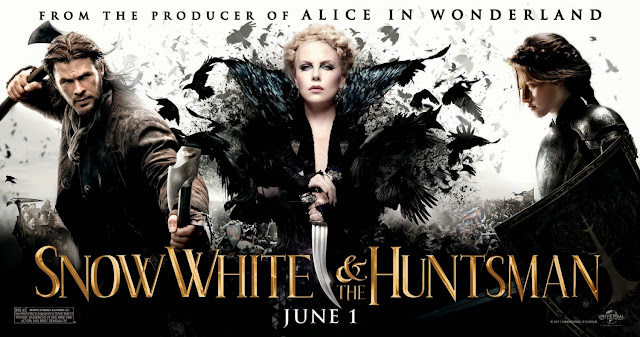 |
| Film poster for Snow White and the Huntsman |
When I first heard that Charlize Theron was going to play The Wicked Queen in Snow White and the Huntsman (Sanders, 2012) I thought this was completely ridiculous; Theron is way too young and, frankly, way too hot. However, that was kind of the point.
Ravenna, aka The Wicked Queen, Theron’s character, bases her whole existence on maintaining her beauty and youth and stands as a symbol for women’s supposed fear of ageing and anxiety toward the ageing female body.
 |
| Charlize Theron is the Queen of Wicked Hot |
 |
| Mirror, Mirror … er, not on the wall |
What is the most obvious symbol of narcissism? A mirror, naturally. And who has a mirror? The Wicked Queen; I see a connection forming. Ravenna’s somewhat obsessive relationship with her mirror is what ultimately becomes her downfall, not her relationship with Snow White. It is the mirror that goads her, telling her that she is not the most beautiful woman in the land; that would be Snow White, who never looks in the mirror and therefore isn’t haunted by the need to find, and ultimately destroy, perfection. As Waugh states:
Mirrors offer an illusory image of wholeness and completeness, the promise of the security of possession, but they too are agents of oppression and control, enticing us with their spurious identifications. (1989:12)
 |
| See, this is what happens when you don’t moisturise |
So, oppressed by the chidings of the man in the mirror, Ravenna tries to ensure that she remains the most beautiful woman of all, and God help you if you get in her way. Ravenna literally sucks the life force out of any young woman in her path, perhaps a tad symbolic? You may be young and beautiful, but your anxieties about your rapidly ageing body — *points at Ravenna* — will eventually suck all the goodness out of you. Not to mention the years of hard work you’ll no doubt face, what with menstruating, having babies, getting paid less than anyone with a penis … I digress.
 |
| Charlize Theron in Snow White and the Huntsman |
Bibliography
Douglas, S. (1995) Where the Girls Are: Growing up Feminine with the Mass Media, Times Books: United States.
Waugh, P. (1989) Feminine Fictions: Revisiting the Postmodern, Routledge: London.
Katherine Newstead is a 27 year-old Film Studies postgraduate, from the University of Exeter. After completing her Masters dissertation on the representation of girlhood in the Disney fairy tale, she has returned to the University of Exeter to write her PhD thesis on the “Othering” of older women in the contemporary cinematic fairy tale.
